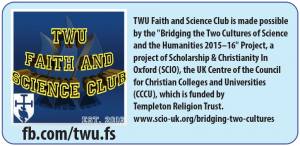Trinity Western University’s Student Association, the TWU Faith and Science Club, and the CSCA are delighted to present a lecture by ASA Fellow and CSCA member Dr. Dennis Venema. UPDATE: TWU’s Dr. Paul Brown will be offering a response from an Intelligent Design perspective, followed by a back-and-forth discussion and Q&A.
“Why I Accept Evolution (And Why You Probably Should As Well)”

Abstract: Evolution is both a well-attested scientific theory and an area of science commonly disputed by Christians. Is it “compromise” or “capitulation” for a believer to accept the findings of evolutionary biology? Should Christians fight against evolutionary theory using “creationism” or “Intelligent Design”? Do the arguments of ID proponents such as Michael Behe, Stephen Meyer, and William Lane Craig stand up to scrutiny? Is an evolutionary understanding of creation in conflict with scripture? This talk will address these questions and argue that Christians are better served by adopting evolutionary
Dennis Venema is professor of biology at Trinity Western University in Langley, British Columbia. He holds a B.Sc. (with Honors) from the University of British Columbia (1996), and received his Ph.D. from the University of British Columbia in 2003. His research is focused on the genetics of pattern formation and signaling using the common fruit fly Drosophila melanogaster as a model organism. Dennis is a gifted thinker and writer on matters of science and faith, but also an award-winning biology teacher—he won the 2008 College Biology Teaching Award from the National Association of Biology Teachers. He and his family enjoy numerous outdoor activities that the Canadian Pacific coast region has to offer. Dennis writes regularly for the BioLogos Forum about the biological evidence for evolution. (Source)
Response and Discussion Time
TWU’s Dr. Paul Brown will be responding to Dr. Venema’s lecture for ten minutes, after which there will be a back-and-forth discussion.
Paul Brown studied biology as an undergraduate and soil and plant chemistry in graduate school. During post-doctoral research at the Max Planck Institute for Chemical Ecology, he studied natural defense compounds in the
model plant, Arabidopsis. His research has been published in various journals, including Journal of Agricultural and Food chemistry, Plant Physiology, and Phytochemistry, and he has been at TWU for 15 years.

